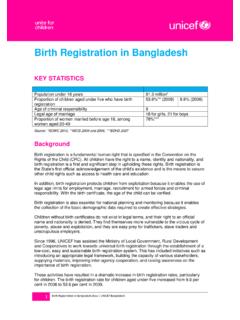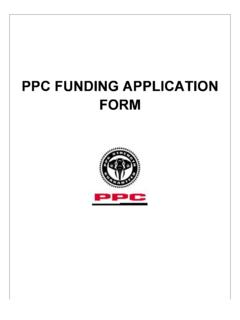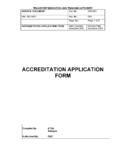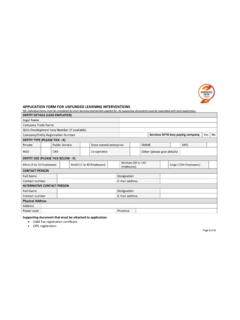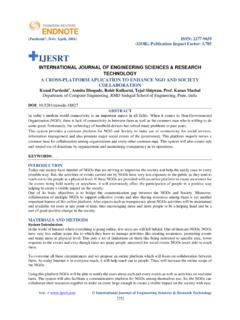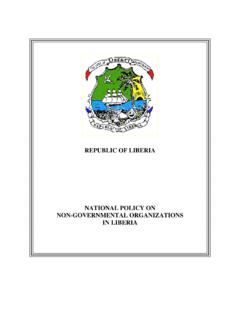Transcription of A Practical Guide to the Financial Management of …
1 Fundamentals of NGO Management1 Fundamentals of NGO Management A Practical Guide to the Financial Management of NGOs Theunis Keulder & Erika Benz Fundamentals of NGO ManagementTheunis Keulder & Erika BenzA Practical Guide to the Financial Management of NGOs Published by Namibia Institute for DemocracyFunded by United States Agency for International Development (USAID) and the Embassy of FinlandCopyright: 2011, Namibia Institute for DemocracyNo part of this book may be reproduced in any form or by any means, electronic or mechanical, including photocopying, recording, or by any information storage and retrieval system, without the permission of the and Layout: DV8 Saatchi & Saatchi Printed by: John Meinert Printing, Windhoek, Namibia, 2011 Language Editor: William Hofmeyr & Leonie Hofmeyr-JuritzISBN.
2 978-99916-865-3-0 Fundamentals of NGO ManagementForewordAs part of its programme to strengthen civil society in Namibia, the Namibia Institute for Democracy (NID) has since 2005 conducted a wide range of training and technical assistance programmes aimed at improving the internal Management of civil society organisations. This Guide , which is published as part of the NID s Fundamentals of NGO Management series, has been developed using inputs obtained from numerous training sessions with NGOs, and is intended to assist organisations in their Financial Management function. It is also used extensively by the NID in training civil society organisations in Financial Management Guide provides an introduction for the non- Financial manager or leader to controlling the finances of an organisation in such a way that the organisation can discharge its duty of being financially accountable.
3 It should be reviewed by everyone in an organisation who is responsible for Financial Management , including those who prepare grant proposals and those who record and report on grant project activities. The Guide is not offered as a complete manual of procedures on Financial administration; it is intended only to provide Practical information on what is expected from organisations in terms of fiscal accountability. To this end, the most important Financial reporting and administrative forms are annexed as templates. A case study is also attached for Practical training this Guide , the term Non-governmental Organisation (NGO) will be used collectively to describe civil society organisations, community-based organisations, non-state actors, welfare organisations, NGOs and any not-for-profit civic groups that have been formed to provide a particular service.
4 Although the main executive position in an NGO is commonly referred to as the Executive Director, Chief Executive Officer or Managing Director for example, in this Guide the term Executive Director will be used throughout for ease of reference. Similarly, the governing board will be referred to as the Board of KeulderExecutive DirectorNamibia Institute for DemocracyFundamentals of NGO ManagementAcronyms and InitialismsNID Namibia Institute for DemocracyNGO Non-Governmental OrganisationPAYE Pay-As-You-EarnSSC Social Security CommissionContentsForeword1 Introduction to Financial Management .. 52 The accounting system.
5 The funding agreement .. The budget .. Bank accounts .. Petty cash .. Procurement .. Recording of project activities .. Payments .. Bank transactions cash book .. Cash transactions petty cash .. Monthly summaries of expenses .. Trial balance .. Balance sheet and income statement .. Audited annual Financial statements .. 163 Reporting to a donor .. 194 Staff administration .. The employment agreement .. Salary payments .. Income tax registration of the organisation .. Income tax registration of employees .. Social Security Commission.
6 The Employee Compensation Act of 1941 .. Administration of leave .. Consultants .. 22 Fundamentals of NGO ManagementAnnexures .. 23 Annex 1: Expense summary .. 24 Annex 2: Reconciliation of donor contribution .. 26 Annex 3: Fixed asset list .. 28 Annex 4: Purchase order .. 30 Annex 5: Attendance register: Grassroots seminars .. 31 Annex 6: Attendance register: Workshops .. 32 Annex 7: Travel claim form .. 33 Annex 8: Daily allowance claim form .. 34 Annex 9: Financial report: Workshop .. 35 Annex 10: Confirmation of goods purchased .. 36 Annex 11: E-bank requisition.
7 37 Annex 12: Cheque requisition .. 38 Annex 13: Petty cash requisition .. 39 Annex 14: Petty cash summary .. 40 Annex 15: Trial balance .. 41 Annex 16: Cash book .. 42 Annex 17: Payslip .. 44 Annex 18: Leave application .. 45 Annex 19: Record of leave .. 46 Annex 20: Honoraria agreement .. 48 Annex 21: Case study .. 49 Bibliography .. 68 Fundamentals of NGO Management51 Introduction to Financial managementLeaders and managers of NGOs have to develop, at the very least, basic skills in Financial Management . Expecting others in the organisation to manage finances is clearly asking for trouble.
8 Basic skills in Financial Management start in the critical areas of cash Management and bookkeeping, which should be carried out following certain Financial controls to ensure integrity in the bookkeeping process. New leaders and managers should swiftly learn how to generate Financial statements (from bookkeeping journals) and analyse those statements so as to develop a real understanding of the Financial condition of the organisation. Financial analysis shows the reality of the situation of an organisation and as such, is one of the most important practices in Management . This Guide will provide you with an understanding of common practice in Financial Management , and help you to build the basic systems and practices needed in a healthy organisation.
9 The Financial situation of an organisation should be reviewed at least on a monthly basis, with the focus on the budget, receipts of income and expenditure. The Executive Director/ Financial officer shall be responsible for ensuring that Financial controls are in place and adhered to and, more specifically, that:expenditures remain within the budget, expenditures are only for the purposes set out in the budget, Financial documentation, including quotations, invoices and receipts are collected and filed in an orderly manner. All staff members, programme beneficiaries, volunteers and board members generally have a responsibility to prevent Financial mismanagement.
10 It is therefore imperative to have internal Financial control mechanisms and policies in place. Internal accounting control comprises a series of procedures designed to promote and protect sound Management practices, both general and Financial . By following internal accounting control procedures, an organisation will significantly increase the likelihood that: Financial information is reliable, so that managers and the Board can depend on accurate information to make decisions,assets and records of the organisation are not stolen, misused or accidentally destroyed,the organisation s policies are followed, government regulations are complied with.

